
Plant-Powered Perspectives conference focusing on the HoReCa sector
For the 3rd time this year, we organised the Plant-Powered Perspectives conference, together with our co-organiser VBC (Vegan Business Circle). The event provides an opportunity for producers, distributors and users of plant-based foods in Hungary to meet, but this year we wanted to target the HoReCa (hotel, restaurant and café) sector. The reason for this is that the difficult situation we are all in is perhaps hitting the hospitality industry hardest. The combination of closures during the pandemic, the war in Ukraine and now the war in Israel, and the sharp rise in energy prices is taking its toll on the hospitality sector. But we have also chosen this segment because, although the number of consumers seeking plant-based cuisine is increasing, there are still many restaurants, bistros and cafes that do not know how to cater for vegetarians and vegans.
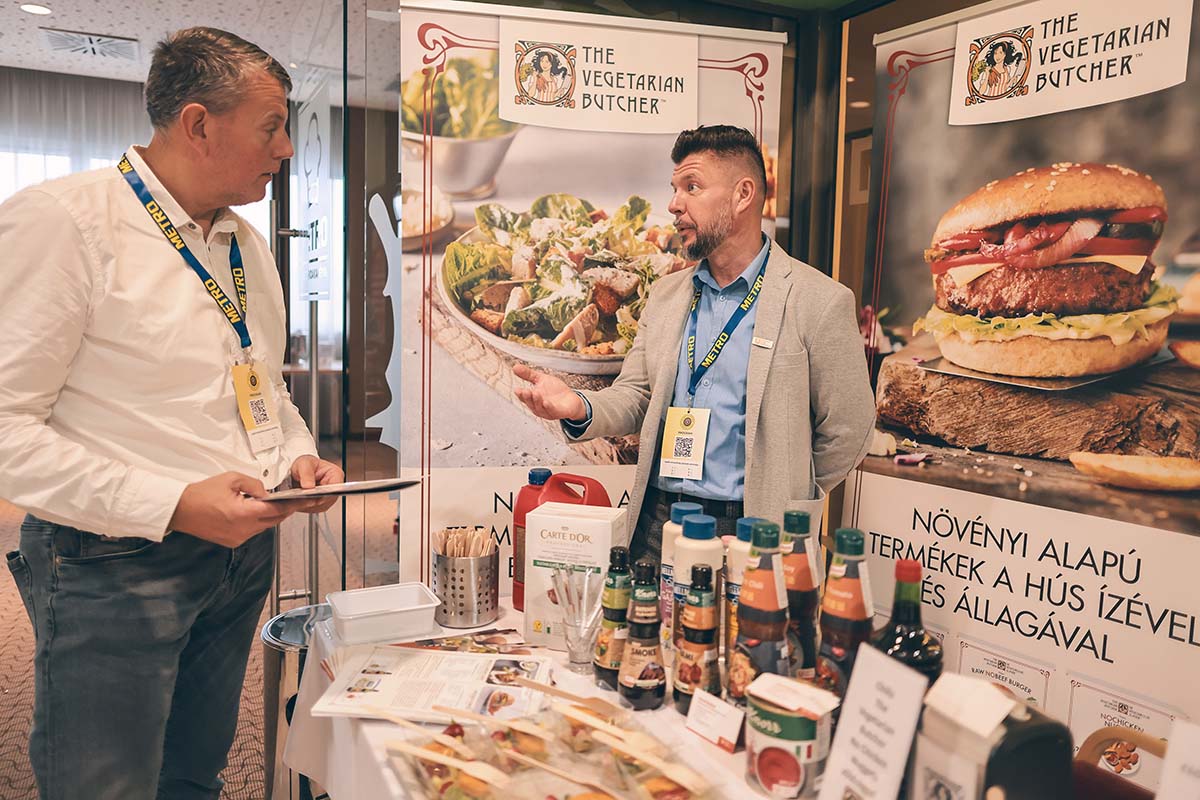
Plant-based food producers and distributors also presented their products / Photo by András Meszlényi
One eye weeps, and the other laughs
Why? Because although many people came, interesting lectures were given and there was an opportunity to expand the network of contacts, fewer non-vegan hosts responded to the invitation, although the 14 November programme could have shown many people a new approach and a new way of thinking, seeing the menus stuck in the world of fried cheese and fried cauliflower. Our association aims to raise awareness among non-vegan and non-vegetarian restaurants in the future.
Plant-based food regulations
The day’s programme opened with a presentation by Dr. Olga Beáta Felkai, Deputy State Secretary for Food Industry and Trade Policy at the Ministry of Agriculture, who spoke about the regulation of plant-based foods based on the position of the Ministry of Agriculture. She said that the ministry is looking at this area from the industry’s point of view and does not want to interfere in what people eat, but rather wants to raise consumer awareness. The consumer knows what he is buying. The Ministry of Agriculture is concerned about food safety and avoiding misleading consumers, at least in terms of the nutritional value and physiological effects of ingredients.
The Deputy State Secretary also addressed the issue of naming regulations, which is a major difficulty for plant-based food companies, and reiterated the need to eliminate the possibility of consumers being misled. As consumers can decide in a few seconds what to buy from a shop shelf, a name should not be on the shelf that they associate with something else, even if the list of ingredients tells them what it is made of. Most consumers do not read this little back label. What is allowed to be marketed under what name is covered by the Hungarian Food Guide.
As a member of the EU, Hungary has to achieve climate neutrality by 2050, so it is essential that the food industry moves towards sustainability. There are also a number of grants available for this purpose, the Deputy State Secretary stressed, adding that there are no restrictions for crop producers and producers of crop products. She added that an action plan for soil protection, animal welfare and animal protection is being prepared, although the latter will only apply to the transport of live animals. She also mentioned the SUR and EFEF plans, but Hungary is still waiting for information from the EU on the details of these plans.
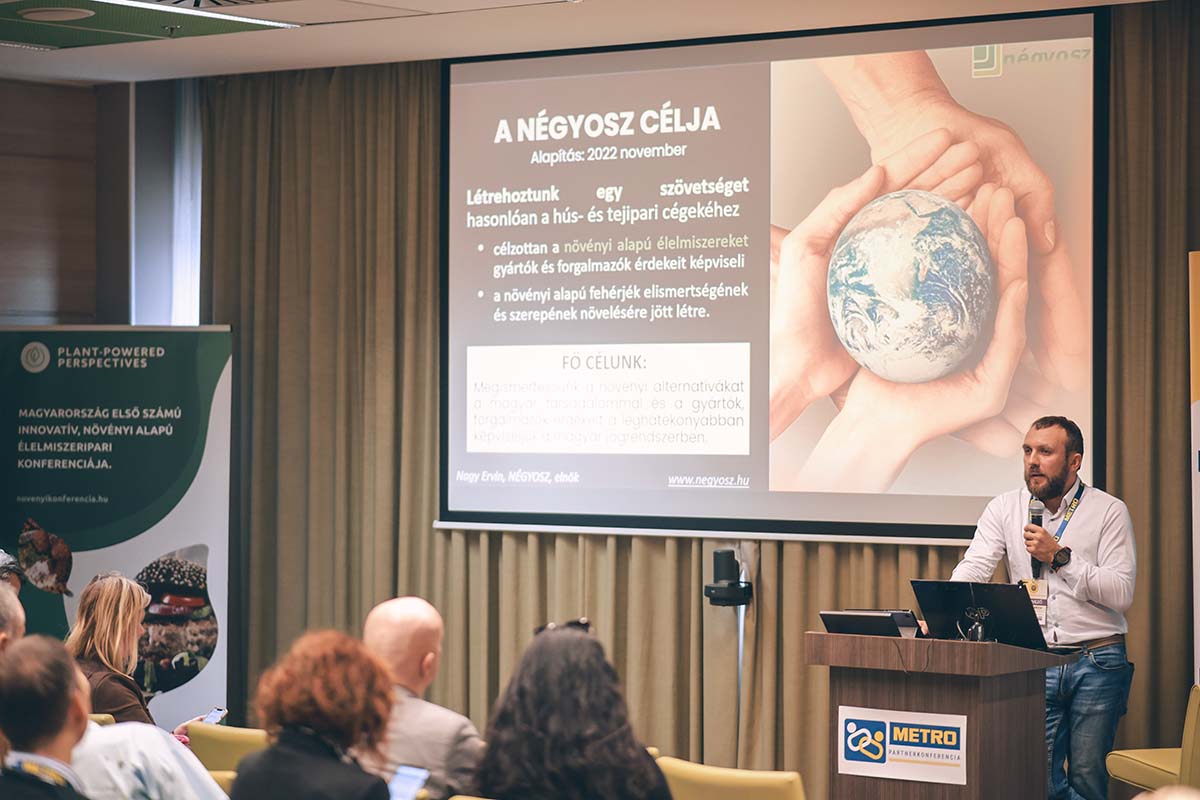
Ervin Nagy presents the aims of NÉGYOSZ at the plant conference / Photo by András Meszlényi
On the threshold of change
Ervin Nagy, President of NÉGYOSZ, summarised in his presentation the many progressive steps that have been taken since the association was founded last year. Among other things, NÉGYOSZ was able to participate in a meeting with the Hungarian Competition Authority on the VAT content of plant-based beverages, had the opportunity to introduce plant-based diets to prison institutions, and held professional discussions with the competent authorities and organisations on product labelling. As an important milestone in the work of the association, he mentioned the consumer habits survey, the results of which were presented in detail during the afternoon programme.
In response to the questions raised by the audience, Ervin Nagy said that there was a clear need for an organisation specifically representing the interests of plant-based food producers, as there were also issues that had yet to be resolved, such as the acceptance of plant-based diets in public catering. In response to another question, Ervin said that the association was primarily set up to represent Hungarian producers and only accepted multinational members in product categories where there were no Hungarian producers on the market (e.g. plant-based milk).
Rapid network
“Does everyone know everyone?” – was the question posed to the audience in the first minutes of the conference by radio presenter Gábor Garami, himself a vegan, who moved routinely in his role as host of the day. Of course, not everyone knew everyone, so many business cards passed from hand to hand and many people enjoyed the impromptu get-to-know-you session, divided into 6 10-minute blocks before lunch. Here you could find a restaurant supplier, a marketing copywriter from a plant-based meat substitute company, but there were also participants from the packaging industry and flavour distributors.

Csaba Péntek, creator of the Vegan Business Circle / Photo by András Meszlényi
Csaba Péntek, the creator of the Vegan Business Circle, gave a short presentation on the VBC, which offers a similar opportunity to get to know each other. All new entrepreneurs looking for business networking are welcome at these vegan business breakfasts.
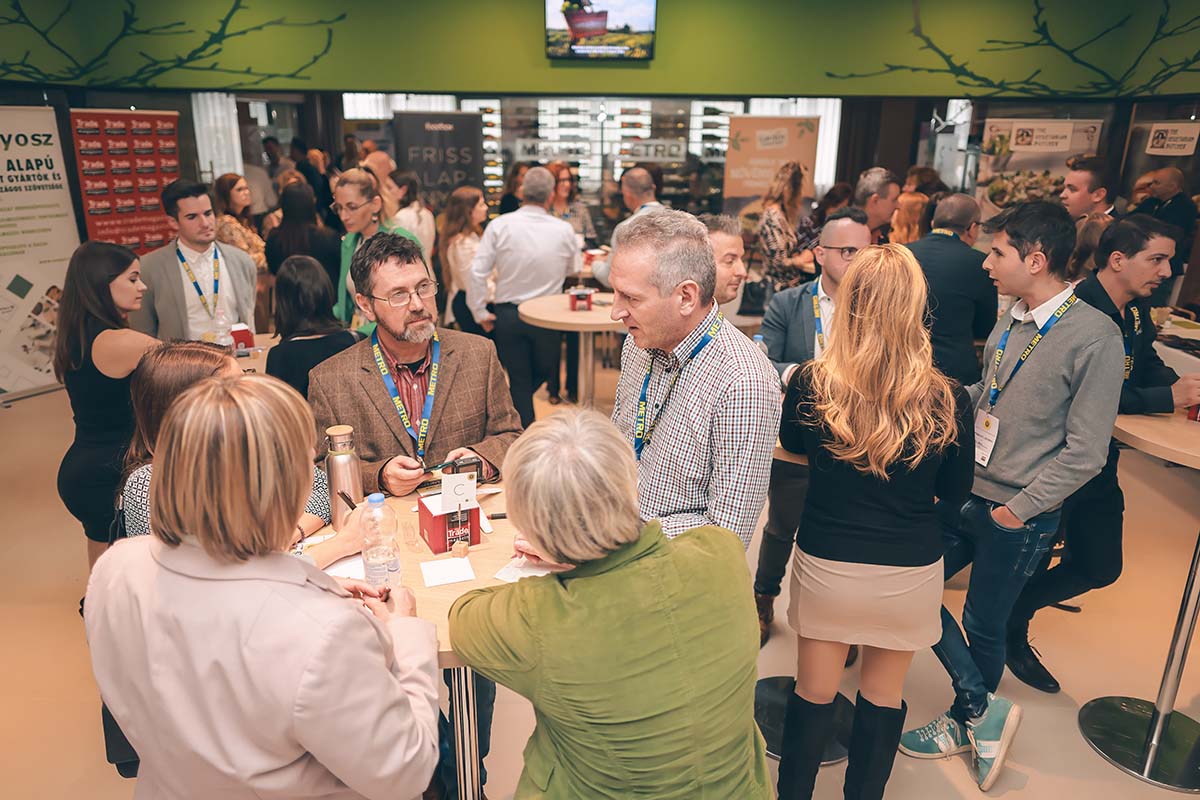
The participants are having a networking discussion / Photo by András Meszlényi
It is essential to move towards sustainable nutrition
The presentation by Diána Sárga, dietician at Nestlé, focused on plant proteins. After presenting the recommended daily intake of protein, she showed that 63% of Hungarian adults consume protein from animal foods (milk and dairy products, eggs, meat) and 37% from cereals and cereal products, while for children aged 4-10 years the proportions are 59% and 41% respectively.
According to the dietician, there is a synergy between a low ecological footprint diet and a healthy diet. He said that plant-based diets should become more widespread and that we should significantly increase our consumption of fruit, vegetables and cereals. A largely plant-based diet improves cardiovascular health and reduces the risk of death from cancer, type II diabetes and coronavirus.
In her presentation, Diána Sárga presented the “planetary health plate”, with vegetables, fruits and mushrooms on one half of the plate and whole grains, vegetable protein sources and unsaturated vegetable oils on the other half. The dietician recommends a maximum of moderate amounts of animal protein, mainly from lean, fermented products, with a reduction or elimination of processed, fatty products.
Nestlé also presented the results of its 2023 online survey. The results show that many people are still inhibited from adopting a plant-based diet by factors such as perceptions of meat, perceived boredom, lack of taste and difficulty in preparing meat-free foods, social and financial reasons and lack of information. Objective reasons include the risk of lack of essential nutrients, such as iron, B12, D vitamins, or even lack of enough protein. A third inhibiting factor is the meat paradox, i.e. the conflict between the enjoyment of food and concern for animal welfare.
Price leads the food purchasing factors, followed by taste and thirdly quality. 56% of respondents said they would not pay more for plant-based products, so price is a very important factor. The same trend can be seen in the result that 61% do not eat meat every day, but this is mainly for financial and health reasons. While for those who never eat meat, animal welfare is the leading reason, followed by the environment and sustainability. In this group, health reasons ranked only 3rd and material reasons 5th among the responses. Only 5% of respondents would abandon all animal products, 31% would reduce them and 64% would not abandon them. Meat would be abandoned by 7%, reduced by 42% and insisted on by 51%.
Plant-based substitutes for animal-based foods are consumed regularly by 3%, 24% have tasted them but do not buy them regularly, 58% have only heard of them and 15% did not know they existed.
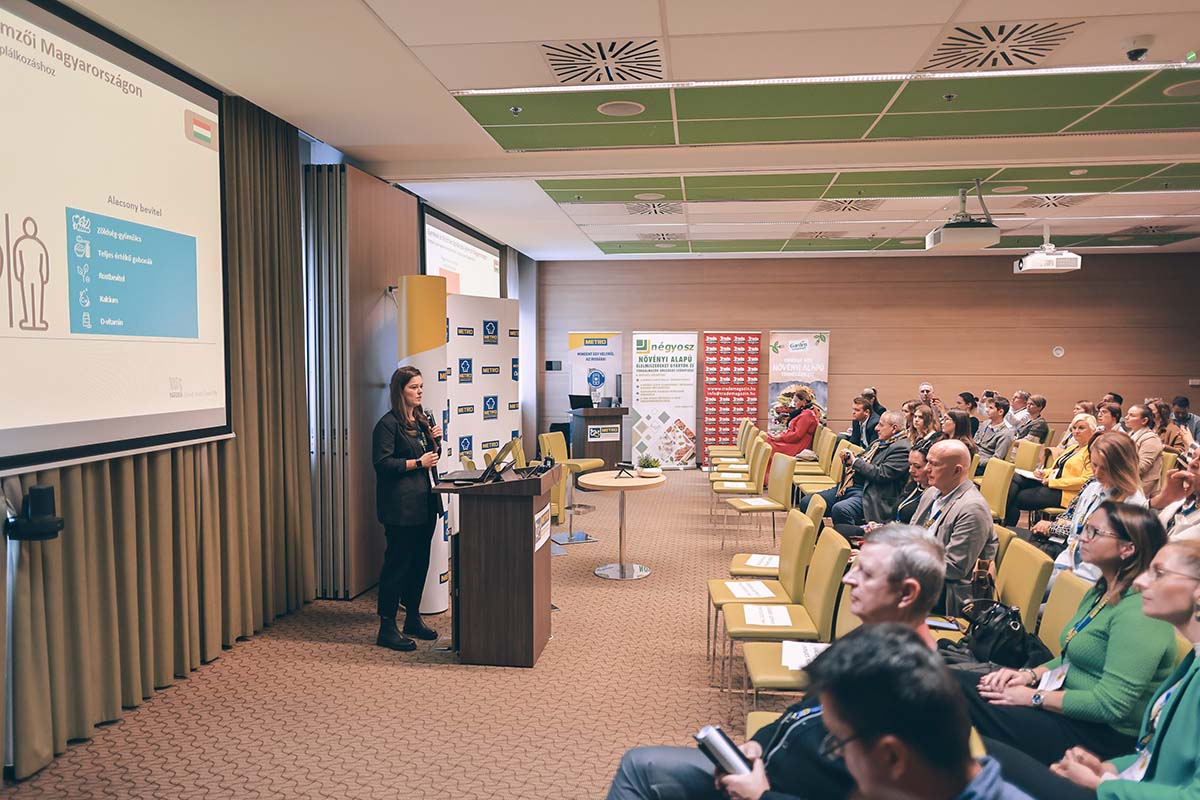
Diána Sárga, dietician of Nestlé / Photo by András Meszlényi
Round table discussions
The conference included a series of panel discussions in which several industry players were invited to discuss a particular topic, led by Ágnes Gólya, a journalist from Direkt36.
The first discussion focused on where it is easier to run a vegan restaurant. Márton Nagy, co-owner of Vegan Garden in Budapest, Dr. Anita Árvai, owner of Veganeeta in Balatonalmádi and Béla Paál, co-owner of Kis Padlizsán in Debrecen shared their experiences on the difficulties they have faced in their operations, how they get through less busy periods, how they balance higher prices, energy costs and wages.
The conversation revealed that they try to survive all year round on the shores of Lake Balaton with the income from the summer months. Rural restaurants can earn extra income by organising team-building trainings, workshops and events during less busy periods. At the same time, in the countryside, whether on Lake Balaton or in Debrecen, it is a lot easier to get local, seasonal produce than in the heart of Budapest, but it is not impossible there either. Vegetable suppliers have changed their sources a lot to adapt to the needs of restaurants such as Vegan Garden. Everyone is fighting a losing battle with spending. Even foreigners who spend a lot of money in the capital’s tourist district sometimes find the prices of their meals too high, so that none of their main courses reaches HUF 5,000, even though the costs would justify an increase. In Debrecen, the restaurant is frequented by people who work in the area during the lunch hour, 98% of whom are not vegans or even vegetarians, but who want a light lunch that doesn’t make them feel tired and who are attracted by variety. This is slightly contradictory to the fact that, at the same time, the rural public prefers a meat-free version of the usual Hungarian dishes, and will more easily say yes to a vegan paprika potato than to a quinoa salad that is foreign to them.

From left to right: Márton Nagy, co-owner of Vegan Garden, Dr. Anita Árvai, owner of Veganeeta, Béla Paál, co-owner of Kis Padlizsán and Ágnes Gólya, journalist / Photo by András Meszlényi
The afternoon slot included a round table discussion on Interests and Conflicts of Interest in Hospitality. What does the guest want, what does the restaurant want and what does the supplier want? How can these be reconciled? This question was explored from the perspective of restaurateurs, suppliers and consumers by István Bruzsa, Nestlé Sales Manager Food, Zoltán Kovács, owner and creative chef of the Sunshine Restaurant, and Eszter Kiss-Szabó, Head of Communications at Felelős Gasztrohős. Cooperation and local produce were also important points in this discussion. Prices jump from month to month, making it difficult to ensure consistent quality at a consistent price. In addition, Zoltán Kovács explained that labour demands cannot be met. Workers want Western European wages that a restaurant cannot match. But even workers who do not even know the basics of the trade, such as cutting, want to start with high salaries. Also the chef of the Sunshine Restaurant pointed out that prices can be balanced by a varied menu. They have premium food at a high price, vegan versions of traditional Hungarian dishes from bean goulash to fried dishes, and they also offer pizza. They can work with ingredients that are only available for a short time, seasonally, and can also offer lower-priced dishes.
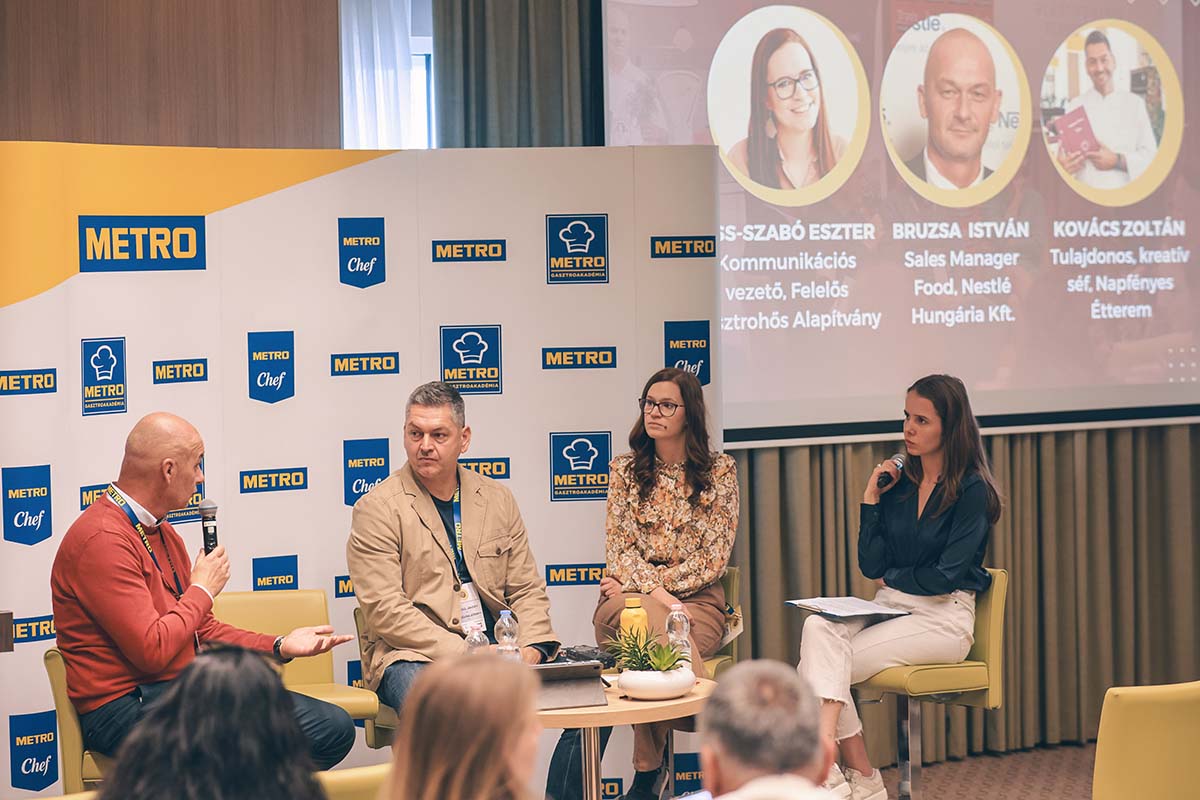
from left: István Bruzsa, Nestlé Sales Manager Food, Zoltán Kovács, owner and creative chef of the Napfényes Restaurant, Eszter Kiss-Szabó, Communications Manager of Felelős Gasztrohős and Ágnes Gólya, journalist / Photo by András Meszlényi
Restaurant owner, chef… Who does it how?
Levente Koppány, chef of Costes, one of Hungary’s Michelin-starred restaurants, senses the growing demand for vegan fine dining. With a single meat-meat-cheese menu, Costes welcomes guests on a pre-booking system, but if a guest indicates in advance that they will not be eating something, it is only natural that a menu is prepared to suit their needs. Although we have often heard that chefs, cooks and restaurant owners are particularly dismissive of guests on a plant-based diet, Levente’s professionalism is reflected in his approach: when the plant-based diet trend started to gain momentum, he himself did a month of such a meal to gain direct experience in developing his repertoire and understanding the guest’s needs. Levente says that the fact that a restaurant nowadays strives to be sustainable and environmentally responsible is not a curiosity, but a basic principle. They also plan waste in advance in the sense that they know how many guests they will have and what they will eat because of the reservation system, so there is no waste.

Levente Koppány, Costes Chef de cuisine / Photo by András Meszlényi
György Takács, who co-owns Madhouse Budapest, became a vegetarian because of his 10-year-old daughter. He tries to balance resources between several businesses, and although Madhouse doesn’t break even, he cherishes it as a love project. In the middle of Budapest’s party district, he’s motivated by seeing his guests having a good time. He’s added vegan options to the menu, and has even decided to offer them cheaper than meat dishes like goulash. So those who just want a bite to eat with a drink will opt for the hummus and vegan options, while those who do eat meat will have to pay the price. He believes that there is so much negativity in our world just by listening to the news or going out on the street, that restaurateurs need to be the counter-pole to that and create a cleaner, happier world. Part of this is the Madhouse’s offering of craft beer, natural wines and clean, plant-based food. In addition to the high costs, he also sees the challenge of retaining and motivating Generation Z employees, but several of his ideas have worked, such as taking employees to museums, because he believes a good exhibition can influence their creativity at work.
Gergely Zsolnay, executive chef of The Planteen and Flow Cafe, answered questions at the end of the day, including what kind of food to look for in a restaurant for those looking for a vegan offering. According to Gergely – and this echoes the sentiments expressed in other presentations – customers are most likely to look for food that their mothers cooked for them. That’s why traditional Hungarian dishes with familiar flavours can be so popular.

Delicacies from the vegan lunch buffet / Photo by András Meszlényi
Consumer behaviour research results
NÉGYOSZ has recently completed a large-scale consumer behaviour survey, the results of which were presented at this conference by István Miskolczi, CEO of NÉGYOSZ.
The survey showed that the proportion of people in Hungary who follow a flexitarian diet is 13%, 2% for vegetarians and 1% for vegans (people who follow a plant-based diet). It is interesting to see that the vast majority of those who identified themselves as flexitarians or vegetarians and vegans have switched to this diet in the last 24 months or 2-5 years at most. There is also a high proportion of those who have been following their current lifestyle for less than 6 months. The data show a recent accelerating trend, even if the growth in our country is slower than in other European countries.
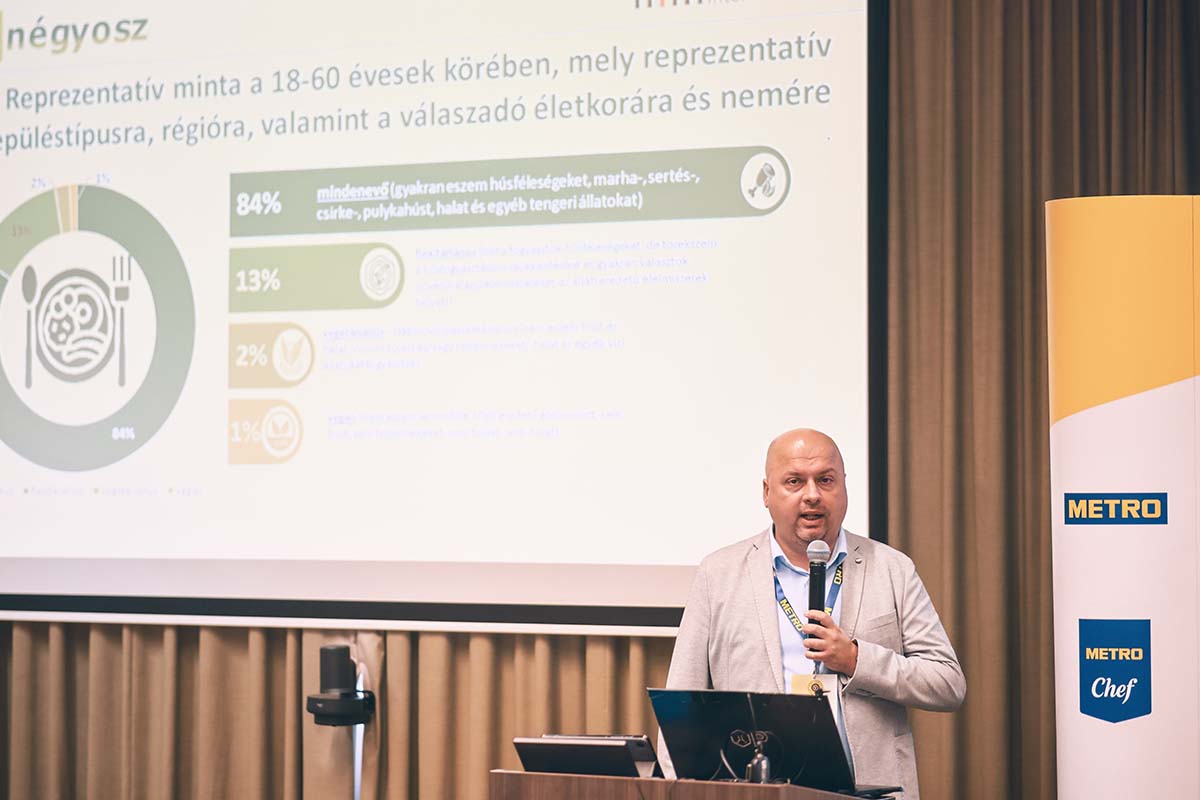
István Miskolczi, CEO of NÉGYOSZ / Photo by András Meszlényi
This survey also showed that price is the main factor influencing the decisions of Hungarian consumers. Therefore, it is not enough to focus on animal rights and sustainability, because if consumers cannot afford to buy vegetable products, they will not buy them. Price is followed by taste, texture and curiosity. Animal welfare, health or the environment come later down the list.
25% of survey respondents think that they will not choose plant substitutes in the future and only 4+6% of those who are sure or likely to seek them out. However, when asked a specific question about giving up dairy, meat and eggs, the responses showed that meat consumption is the most likely to be reduced, with more people considering giving it up than other animal products.
NÉGYOSZ plans to carry out further research, with a particular focus on a regular survey of the consumption habits and choices of Generation Z.
Omnivore celebrity vs vegan celebrity
Perhaps the most entertaining programme of the day was hosted by gastronomic writer and presenter Kristóf Steiner and gastronomic expert Gianni Annoni, owner of Pomo D’Oro restaurant. However, the discussion, billed as an omnivore-vegan debate, was a peace pipe from the start, with Kristóf stressing that he was neither trying to convince nor judge Gianni’s eating habits, as he himself was an omnivore until 15 years ago. They agreed on almost everything, emphasising the importance of enjoying food and finding pleasure rather than criticising restaurants. Gianni said that, although he does not plan to go meatless, Italian cuisine is not meat-based, mainly vegetables and olive oil. The biggest problem he sees is waste, that whatever you eat, you don’t eat all of it, and there is a lot of waste. In his own restaurant, he sees that many people leave out the vegetable salad. He added that he would not go to a place that served ‘fake meat’ and substitutes. However, Kristóf says these products help those who are new to the great flavours of vegan cuisine. He says people are looking for complex flavours.
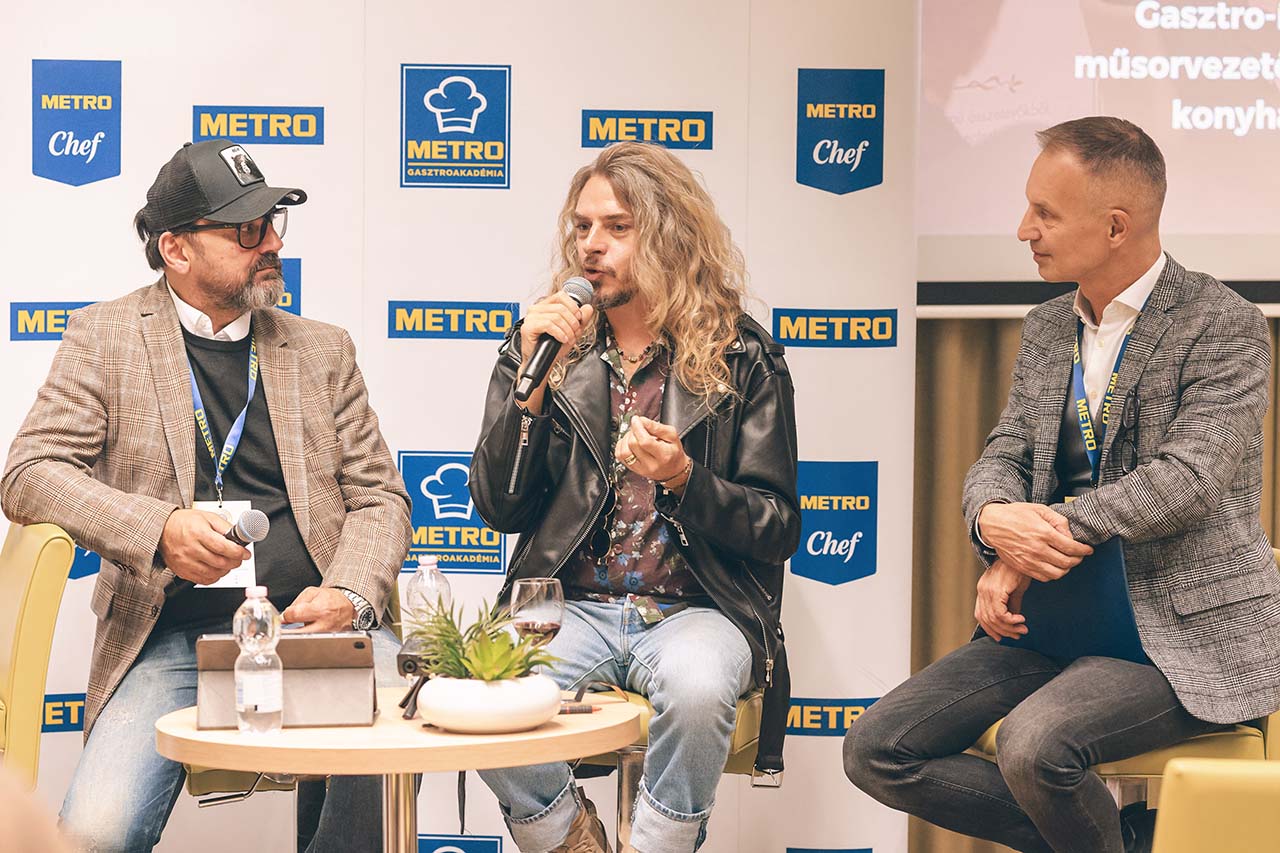
from left: Gianni Annoni, Kristóf Steiner and Gábor Garami / Photo by András Meszlényi
Kristóf also encouraged fast food restaurants and large corporations that want to greenwash themselves with the idea that while they may still use meat and other animal ingredients, if they introduce their first vegan sandwich now, they might have three next year because so many people will be interested. Kristóf says it may be naïve, but it could get to a point where fewer people will choose meat burgers than vegan ones.
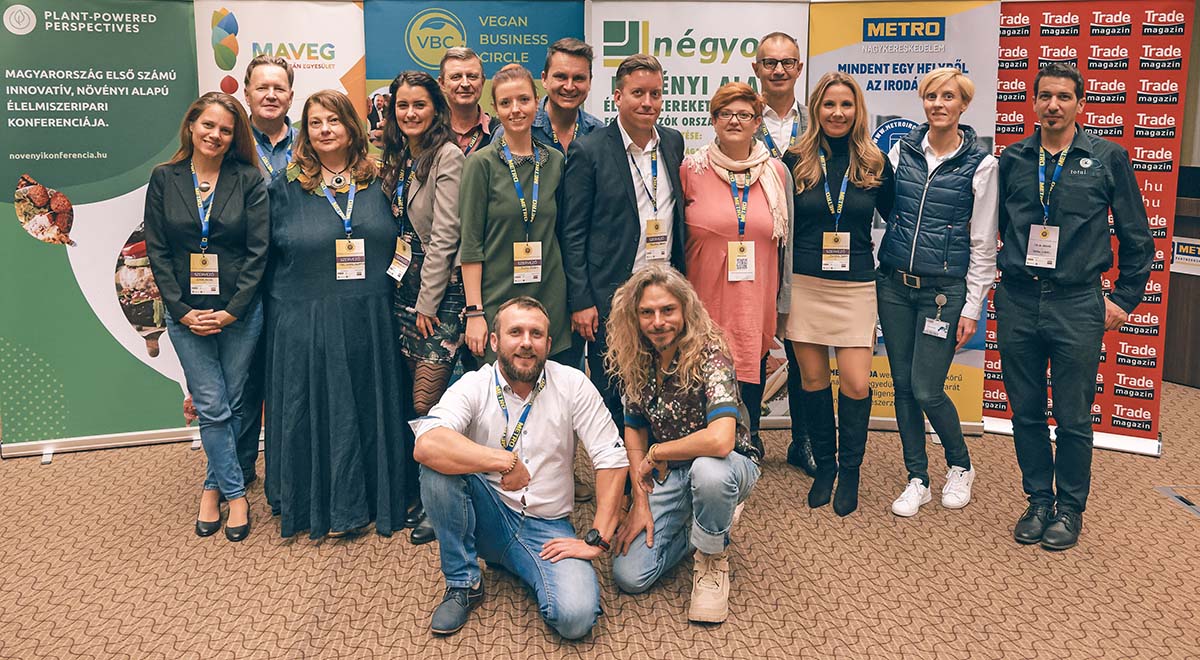
Our organizing team / Photo by András Meszlényi